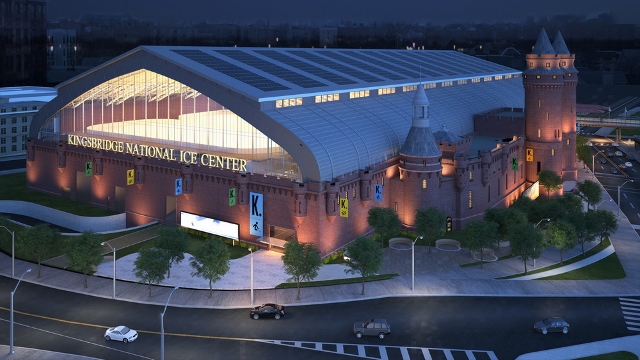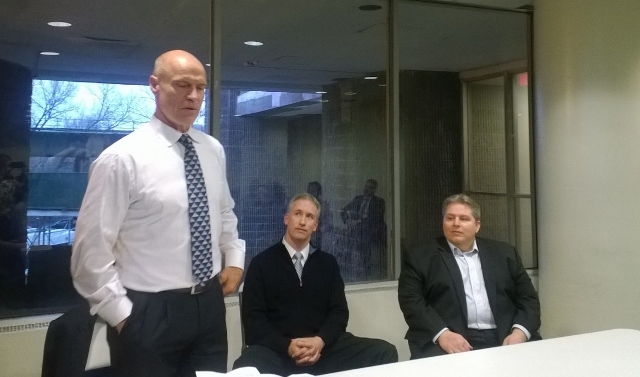
Photo courtesy Kingsbridge National Ice Center Partners LLC
By HAYDEE CAMACHO
At a recent meeting sponsored by Community Board 7’s Economic Development Committee, Mark Messier, CEO of Kingsbridge National Ice Center (KNIC), reassured the stakeholders in and around the Kingsbridge community that plans to develop a nine-rink, 5,000-seat arena at the Kingsbridge Armory are proceeding apace despite nearly a year of delays.
But as officials get the project off the ground, albeit slow, community members have felt closed out of its progress and even more confounded by procedures involving the impending Community Advisory Council (CAC), born out of a stipulation from the Community Benefits Agreement (CBA). The legally binding contract became a flashpoint to the Kingsbridge neighborhood’s acceptance of the project. But, good or bad, the CBA has become a closed matter after 26 signatories signed the document, rendering any challenge useless. Still, questions persist.
Messier, who’s been tied to the project since 2012, pledged to be guided by the principles of the Community Benefits Agreement brokered by community stakeholders and KNIC Partners LLC. “We come as partners in the community,” Messier told guests at the March 31 committee meeting. It was the first time Messier spoke to the public following a judge’s ruling that the $350 million ice rink plan can continue without Jonathan Richter, Marcus Wignell and Jeff Spiritos. The three were KNIC Partners LLC operatives often seen meeting with community leaders to discuss the project early on. The legal drama resulted in nearly a year delay for the project, which kept KNIC officials out of the cavernous Armory pending the outcome of litigation.
Community Advisory Council
Questions about the formation and transparency of the 11-member Community Advisory Council, which will provide oversight of the CBA, remain unanswered. According to the CBA, District 14 Council Member’s Office (currently held by Fernando Cabrera), the chair of Community Board 7 and Northwest Bronx Community & Clergy Coalition will each appoint three members. KNIC will appoint one member and there will be a member at large.
“One of the reasons why we had the meeting two weeks ago is because a lot of things are not transparent,” said Eleanor Lundeen, chairwoman of CB7’s Economic Development Committee. “There is no process that I’m aware of, no date or criteria for how people get selected.”

A spokesman for Bronx Borough President Ruben Diaz’s office, which rooted extensively to see the project get off the ground, said his office will not be involved in CAC procedures or have any oversight of its activities.
Another issue related to the CBA is what criteria will be used to select community groups to occupy the 52,000-square-feet allocated to the neighborhood. “Until we have an advisory committee working on it, we won’t actually know,” said Lundeen.
Sandra Lobo, president of the Board of Directors of NWBCCC, said that the Kingsbridge Armory Redevelopment Alliance, an arm of the NWBCCC, hopes to be involved with convening signatories and community groups to ensure that the process of selecting groups is reflective of the groups most impacted in the area.
Messier said at the meeting he still anticipates a completion date of 2018 and added that detailed information regarding the development of the project, including the unveiling of a website, will be released in May during Bronx Week.
For Lundeen, the timing raises additional concerns since community boards do not meet after June. “A lot can happen in July and August,” she said.
Among the new developments was a recent announcement by the Albany Legislature, which committed $1 million for an assessment of the elevated 4 subway train abutting the Armory.

Photo by David Cruz
Revisiting the CBA
NWBCCC, KARA and other community stakeholder groups were key players in the development of the CBA, which stipulates benefits for Kingsbridge residents. Among the agreement’s key provisions is a $10 minimum hourly wage, 51 percent of jobs for Bronx residents and 51 percent procurement from minority/women owned businesses.
“For the last two years we’ve done intensive interviews with all types of people from construction companies, construction managers, project managers, to law firms to insurance companies,” said Messier. “What serves as our moral beacon for this whole project is our CBA. We feel this is a collaboration between the Kingsbridge team and the community.”
But Fernando Tirado, former CB 7 district manager, feels the process of creating the CBA was not transparent enough to allow for a more diverse group of community groups to participate. “I have said time and again that the merchants association should have been approached sooner than at the 11th hour asking them to come on board,” said Tirado, referring to the Kingsbridge Road Merchants Association.
Sandra Lobo, president of the Board of Directors of NWBCCC, which led CBA negotiations, said that the merchants have always been an integral part of the community benefits process and they continue reaching out to them for input. “They are an important part of our community. We want to ensure that they are being supported,” said Lobo.
Lobo added that the CBA includes scholarships and funds to local businesses to support the development and upgrading of their businesses. This can include improvements to awnings and better signage. “They were certainly part of the conversation in those negotiations,” she said.




